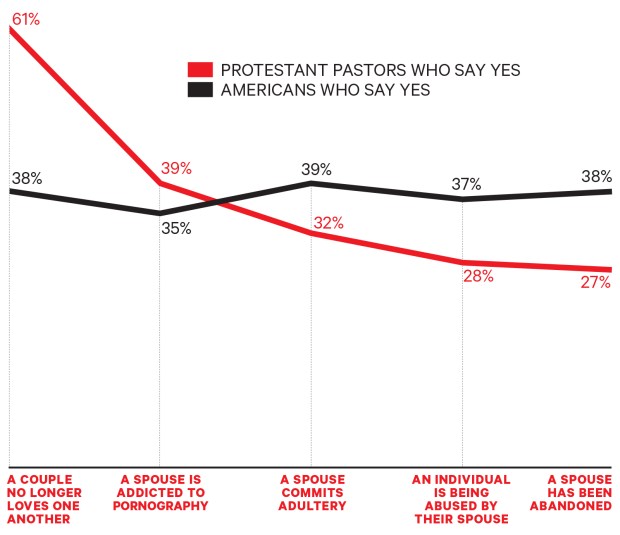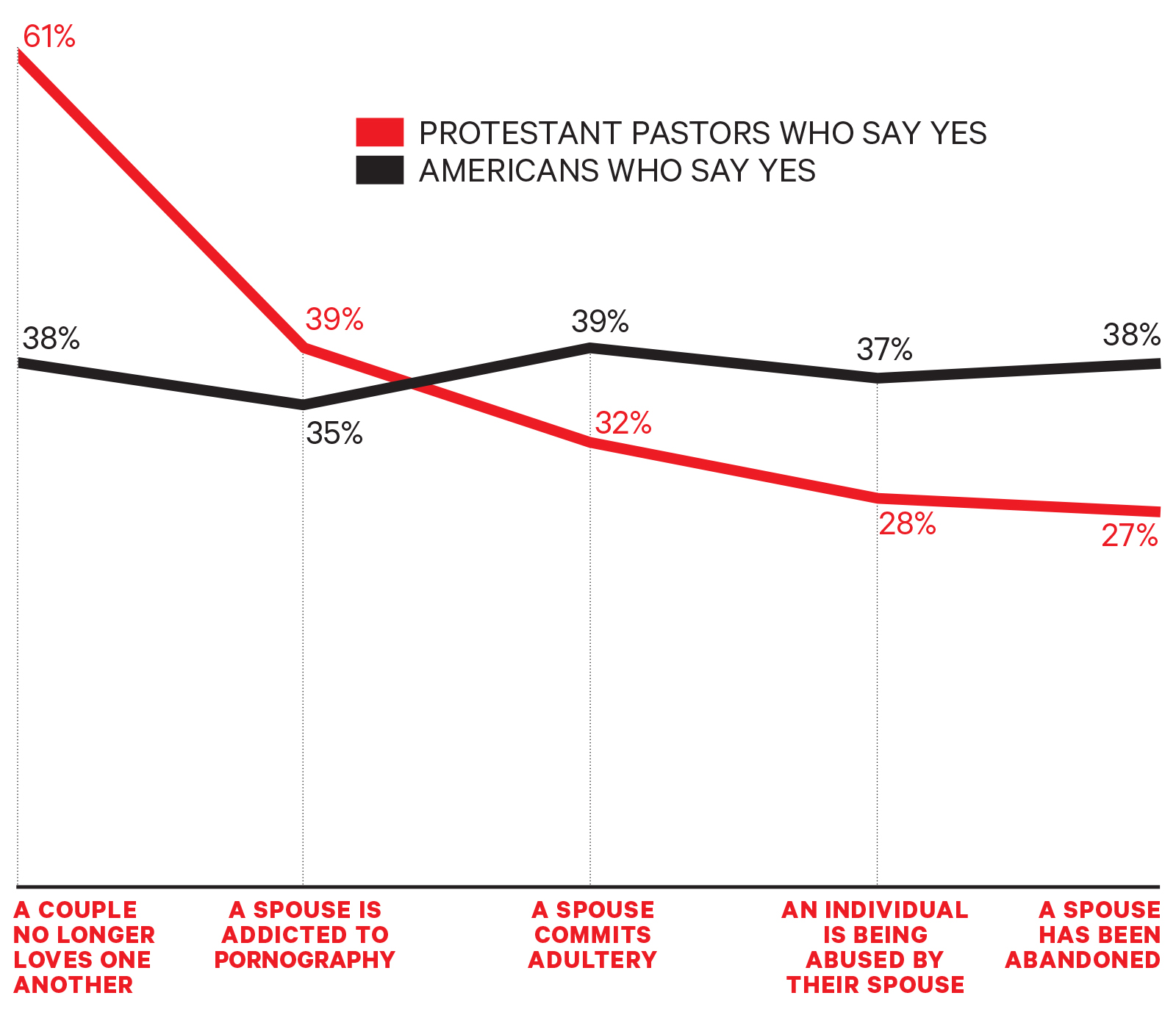Divorce is a sin when . . .
Protestant senior pastors are more forgiving of divorce than most Americans in cases of adultery, abuse, and abandonment, according to LifeWay Research. However, Americans in general are about twice as likely as Protestant pastors to say divorce is never a sin (37% vs. 19%) in the below situations. The latest General Social Survey suggests 38 percent of weekly churchgoing evangelicals have been divorced.

Baptist missionaries lose jobs
Two months after promoting plans to send out “limitless” numbers of missionaries, the International Mission Board (IMB) revealed it needs to cut 600–800 missionaries and staff in order to balance its budget. The Southern Baptist Convention agency, which overspent its revenue by $210 million over the past six years, faces a $21 million shortfall this year. President David Platt said he didn’t want to question the decisions made by past IMB leaders, who used foreign property sales and cash reserves to help fund missionaries. And the IMB still expects to send 300 new missionaries in 2015. But Scott Moreau, editor of Evangelical Missions Quarterly, told Christianity Today, “This might be a step toward the demise of the centrally funded mission agency.”
Family Christian sheds debt
After six months of wrangling in bankruptcy court, the largest US Christian retail chain will get a second shot at solvency. Family Christian Stores was able to shed $127 million in debt during its sale to a related entity. The sale was approved 162 to 7 by its creditors, many of them Christian publishers and vendors hoping to keep the chain as an outlet for their products. (At least one publisher, Gospel Light Publishing, filed for bankruptcy in the wake of the deal, citing $143,000 in lost income from Family Christian as a factor.) Suppliers will be paid cents on the dollar for products they shipped to the retailer, but “getting something is better than nothing,” said Mark D. Taylor, president of Tyndale House Publishers.
Two universities leave CCCU over sexuality
Union University and Oklahoma Wesleyan University withdrew from the Council for Christian Colleges and Universities (CCCU) this summer. The schools said the umbrella association took too long to decide what to do about two other members—Eastern Mennonite University and Goshen College—that now allow faculty and staff to be in same-sex marriages. The CCCU consulted all the presidents of its North American member schools before a proposed September 21 conference call. The CCCU represents 35 denominations that differ on issues such as baptism, conception, and human origins. “Until very recently, there was not a divergence of opinion regarding hiring same-sex-married persons,” said CCCU president Shirley Hoogstra. “Now there is.”

Myanmar: Acquire the Fire makes overseas debut
Ron Luce’s Teen Mania ministry picked Myanmar (Burma), a Southeast Asian country that regularly appears on lists of the hardest places for Christians to live, to host Acquire the Fire’s first overseas rally. The two-night conference in Yangon drew 13,000 people, a success that was important for Teen Mania, one of America’s most insolvent ministries. The Myanmar Evangelical Christian Fellowship invited Teen Mania because it is looking to stem secular values among Burmese youth, who are quickly embracing cell phones and Internet access.
India: Christians happy that census shows few converts
Emboldened by the election of a Hindu nationalist last year, some Indian political groups have cracked down on non-Hindus, accusing Christians of forcible conversions. But the latest census data disproves that; it shows that Christianity grew more slowly than the overall population, and composes only a 2.3 percent share. Evangelism often doesn’t cross cultural lines in India [“Babies Halt the Great Commission,” CT Sept.]. However, Christianity is growing in underground communities, reports the Center for the Study of Global Christianity. It predicts Christians will grow to almost 7 percent of India’s population by 2050.
Workers protest biblical salary switch
In a modern-day rendition of the parable of the workers in the vineyard, top-paid employees took issue with the announcement by Dan Price—graduate of Seattle Pacific University and CEO of Seattle-based Gravity Payments—that the minimum wage for employees of his credit-card processor would be $70,000. Two top employees quit in protest, and Price’s brother and co-owner filed a lawsuit. However, other employees said they are replacing worn car tires and feeling secure enough to start a family. Price, who cut his own salary from $1 million to $70,000, told The New York Times that he was “committed to making my vision a business success.”
Israel: Christian schools strike over funding cuts
Nearly 50 Christian schools in Israel stayed shut when the academic year began in September, protesting steep cuts in state funding that administrators allege are discriminatory. The Jewish state recently reduced its funding for the Christian schools, which teach about 33,000 mostly Arab students, from 45 percent to 29 percent of tuition. Meanwhile, it continues to fund 100 percent of tuition at Hasidic schools. Talks with the Ministry of Education, as well as a personal meeting with Israel’s president, failed to reach a compromise. Christian administrators pledged, “We will not back off until we receive our full rights.”












